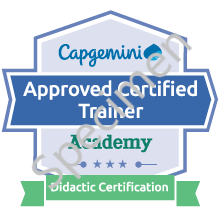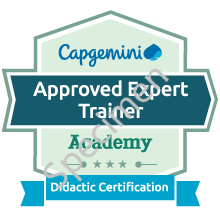-
Didactic Certification
All trainers at Capgemini Academy have a didactic certification.
For trainers who are employed by Capgemini it applies that they must have a license from the Capgemini Academy Didactic Certification Board in order to be able to provide training on behalf of the Academy.
For trainers who are not employed by Capgemini, this certification may consist of an external certification provided by an accreditation body. In addition, based on evaluation results and experiences, we also provide them a didactic certification if the conditions are met.
The Capgemini Academy Didactic Certification has 3 levels, namely Licensed, Certified and Expert.
For trainers not employed by Capgemini, there are 2 levels, Approved Certified and Approved Expert.
There are different didactic requirements for these levels. In addition, every trainer is an expert in their own field.
This set of requirements makes that our trainers have a unique combination of knowledge and skills, with which we deliver high and consistent quality. Our training courses receive 8.7 on the entire portfolio of our customers at Springest and the evaluations of our trainers are on average even higher.
Licensed Trainer:
The "Licensed" trainer provides training independently, in accordance with the quality requirements of Capgemini Academy and is a proven professional in its own field. The trainer knows the relevant procedures of Capgemini Academy and acts accordingly. The trainer has basic knowledge of didactics and is aware of his role as a trainer.
Certified Trainer:
The "Certified Trainer" is thoroughly trained in didactics and can steer towards group dynamic processes, including dealing with student resistance and diversity in composition (including language, culture, learning styles and learning preferences). The "Certified Trainer" knows the vision of the Academy on learning and is able to apply the learning principles. In addition, the Certified Trainer is a professional in their own area of expertise.
Expert Trainer:
The "Expert Trainer" is an experienced trainer, knows the latest developments in the field of didactics and knows how to express Capgemini Academy's involvement therein. In addition, the "Expert Trainer" is also a demonstrable expert in the field for which it provides training.
The "Expert Trainer" contributes to the development of his colleagues and the portfolio. The trainer trains employees from all levels of the customer organization.
Approved Certified Trainer:
The "Approved Certified Trainer" is thoroughly trained in didactics and can steer towards group dynamic processes, including dealing with student resistance and diversity in composition (including language, culture, learning styles and learning preferences). The "Approved Certified Trainer" is not employed by Capgemini, but knows the vision of the Academy on learning and is able to apply the learning principles. In addition, the Approved Certified Trainer is a professional in their own area of expertise and has trained a large number of participants for Capgemini Academy with a high personal evaluation score.

Approved Expert Trainer:
The "Approved Expert Trainer" is an experienced trainer, knows the latest developments in the field of didactics and knows how to express Capgemini Academy's involvement therein. In addition, the "Approved Expert Trainer" is also a demonstrable expert in the field for which it provides training.
The "Approved Expert Trainer" contributes to the development the Capgemini Academy portfolio. The trainer trains employees from all levels of the customer organization and has trained a very large number of participants for Capgemini Academy with a very high personal evaluation score.Before any trainer starts they enroll into a training program on didactics.
This program entails the following:
In this training you will learn the didactics you need to give a training. We discuss learning styles, learning preferences, learning principles, learning objectives, working methods, interventions and group dynamics. You practice with part of your own training, and you receive feedback.
This is a blended training: you carry out assignments before and between the group training sessions.
The structure is as follows:- week 1: master your didactic principles through self-study & asynchronous interaction with other students. You do this in an online learning platform.
- week 2: 1 half day group training, in which we bring these principles to life and practice.
- week 3: deepening & asynchronous interaction with other students – in an online platform. Prepare to deliver part of your own training.
- week 4: 1 half day group training. Practice with part of your own training, give and receive feedback, experiment with working methods and interventions.
We expect your active commitment throughout the period. This way you become a trainer who feels confident for the group, responds to what is happening in the group and can transfer knowledge well.
The training is suitable for Capgemini subject matter experts who want to be able to transfer their knowledge and skills in a professional manner to a group. No entry level is required for this training. We assume that you have minimal experience as a student. During the training, learning situations are tailored to everyone's individual level.
At the end of the training, the participant is able to:
- Define learning objectives in terms of knowledge, insight, skills and attitude.
- Make a choice from various work forms.
- Design a training program using the screening method, including preparations
- Give a clear explanation.
- Presentation technique Interaction with the audience to be stimulated
- Deal with questions from the audience
- Give an assignment and to discuss the end result
- Deal with different tools to apply
- Group dynamic principles
- Recognize and deal with signals of resistance and other emotion
- Developing a personal style, with attention to assertiveness and regulating tension (self-management)
- Give and receive feedback

